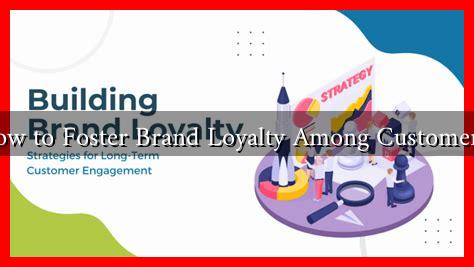-
Table of Contents
How to Foster Brand Loyalty Among Customers
In today’s competitive marketplace, fostering brand loyalty is more crucial than ever. With countless options available to consumers, businesses must go beyond merely providing quality products or services. They need to create an emotional connection with their customers. This article explores effective strategies to cultivate brand loyalty, supported by examples, case studies, and relevant statistics.
Understanding Brand Loyalty
Brand loyalty refers to the tendency of consumers to continue buying the same brand over time, regardless of price or convenience. It is a powerful asset for any business, as loyal customers are more likely to make repeat purchases, recommend the brand to others, and provide valuable feedback. According to a study by Help Scout, acquiring a new customer can cost five times more than retaining an existing one, highlighting the importance of loyalty.
Strategies to Foster Brand Loyalty
Here are several effective strategies that businesses can implement to build and maintain brand loyalty:
- Deliver Exceptional Customer Service
- Engage with Customers on Social Media
- Implement a Loyalty Program
- Personalize the Customer Experience
- Solicit and Act on Customer Feedback
- Maintain Consistency Across All Touchpoints
Customer service is often the first point of contact between a brand and its customers. Providing exceptional service can create a lasting impression. For instance, Zappos is renowned for its customer service, offering free shipping and a 365-day return policy, which has helped them cultivate a loyal customer base.
Social media platforms are powerful tools for building relationships with customers. Brands that actively engage with their audience through comments, messages, and interactive content can foster a sense of community. For example, Starbucks uses social media to connect with customers, share user-generated content, and promote their loyalty program.
Loyalty programs incentivize repeat purchases by offering rewards, discounts, or exclusive access. According to a study by Talend, 79% of consumers say loyalty programs make them more likely to continue doing business with a brand. Brands like Sephora and Starbucks have successfully implemented loyalty programs that encourage repeat purchases and increase customer engagement.
Personalization can significantly enhance customer loyalty. By leveraging data analytics, brands can tailor their offerings to meet individual customer preferences. Amazon excels in this area, using algorithms to recommend products based on past purchases, which not only increases sales but also fosters a sense of loyalty among customers.
Listening to customers and acting on their feedback demonstrates that a brand values their opinions. Companies like Apple regularly solicit feedback through surveys and product reviews, using this information to improve their products and services. This approach not only enhances customer satisfaction but also builds trust and loyalty.
Consistency in branding, messaging, and customer experience is vital for building trust. Brands like Coca-Cola maintain a consistent image and message across all platforms, which reinforces their identity and fosters loyalty among consumers.
Case Studies of Successful Brand Loyalty
Several brands have successfully implemented strategies to foster loyalty:
- Apple: Apple has cultivated a loyal customer base through innovative products, exceptional customer service, and a strong brand identity. Their ecosystem of products and services encourages customers to remain within the Apple family.
- Nike: Nike’s “Just Do It” campaign and its focus on community engagement through events and social media have created a strong emotional connection with customers, fostering loyalty.
Conclusion
Fostering brand loyalty is an ongoing process that requires dedication and strategic planning. By delivering exceptional customer service, engaging on social media, implementing loyalty programs, personalizing experiences, soliciting feedback, and maintaining consistency, businesses can create lasting relationships with their customers. As the marketplace continues to evolve, brands that prioritize loyalty will not only survive but thrive in the long run. Remember, loyal customers are not just repeat buyers; they are brand advocates who can significantly impact your business’s success.

